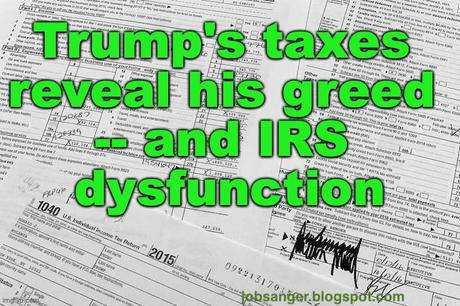
The following is from the editorial board of the Houston Chronicle:
After years of fighting to keep them private, former president Donald Trump’s tax returns have finally seen daylight, thanks to the diligent efforts of the House Ways and Means Committee. The release followed the committee's report summarizing many of the findings earlier in the month.
"A president is no ordinary taxpayer," committee chairman Rep. Richard E. Neal (D-Mass.) said in a statement. "They hold power and influence unlike any other American. And with great power comes even greater responsibility."
More than a time-honored tradition of our most powerful elected official, turning over tax returns is critical for the American public to get an understanding of who is sitting in that office, and who elsethey might be beholden to. It took a massive effort to wrest these returns from Trump’s sticky fingers and deliver them to the citizens he was elected to represent. There was public pressure, Congressional inquiries and lawsuits that reached the United States Supreme Court.
So what did we learn from the thousands of pages of information?
More shocking than the years Trump managed to pay just $750 in taxes, the year he paid none at all or his ongoing business deals with foreign companies while president, is the inaction on the part of the IRS. Since the 1970s, presidential tax return audits are supposed to be automatic and annual.
“The IRS did not even begin auditing Trump’s taxes until 2019,” Noah Bookbinder wrote in the Atlantic, “on the same day the committee began asking the agency about them.”
Alarm sounded.
“That Trump has avoided paying taxes and engaged in questionable practices is hardly new,” Timothy L. O’Brien is senior executive editor of Bloomberg Opinion and author of “TrumpNation: The Art of Being the Donald” wrote ahead of the release
While that doesn’t mean his dealings are any less concerning, it does make the revelation that the IRS failed to audit Trump’s returns stand out all the more.
That alone needs investigating.
The IRS doesn’t have a great track record when it comes to going after the rich and powerful. In the agency's defense, dealing with high-powered attorneys requires more resources than going after an ordinary, middle-class taxpayer who probably can't afford an attorney at all. And the IRS budget operated on a starvation diet for years.
Indeed, the agency audits poor families five times more often than it does everyone else, according to a recent analysis of 2021 data from Syracuse University. Of the nearly 9 million residents who reported incomes between $200,000 and $1 million, fewer than40 individuals had their tax returns audited by the IRS in fiscal year 2021.
Poor people are simply low-hanging fruit, easily intimidated into submission by jargon-laden letters demanding technical information that's often difficult for families to produce, let alone understand. If anyone needed assistance, according to Erin M. Collins, the National Taxpayer Advocate’s recent Congressional report on the agency’s actions, they were often stuck calling an understaffed toll-free number that was rarely answered— even after hours of waiting on hold.
“There is no way to sugarcoat the year 2021 in tax administration: From the perspective of tens of millions of taxpayers, tax administration did not work for them,” the report begins.
This is especially galling knowing just how seldom America’s wealthiest citizens pay their fair share of taxes. Elon Musk paid zero dollars in federal income tax in 2018, something Jeff Bezos, Michael Bloomberg and George Soros can also brag about, per a recent ProPublica investigation
Even knowing the IRS’ punitive and uneven approach to auditing, it is still alarming that it would shirk its legal obligation to audit Trump’s returns, until enough public pressure pushed them to.
In 2022, when President Joe Biden signed legislation that added $45 billion to the IRS’ enforcement efforts, it raised alarms. "Biden Admin Targets Lower & Middle Income Earners," read one release from the House Ways and Means Committee Republicans. There is no 87,000-strong army of auditors on the way but there will be more audits although the administration promised they would target higher earners: "It’ll lower the deficit and ask the ultra-wealthy and corporations to pay their fair share," a White House release said of the legislation.
Will they actually target the billionaires doing everything they can to avoid giving even a dime to the running of this country? Or will they simply step up the nickel-and-diming of America’s poorest families?
When it comes down to it, the IRS has long been stretched thin. As bean counters working with scant resources and an ancient data system, their priorities are heavily influenced by levels of funding from Congress and perhaps, the political will of those in power, namely the guy in the White House.
The IRS' failure to audit Trump while in office warrants scrutiny for the agency and also for those who oversee it and fund it.
How much do we blame the bureaucrats and how much to blame the people above them? It's up to Congress to make sure the IRS is funded enough to do properly do its job. And with this new funding, the IRS should, in fact, live up to the administration's promises and ensure that all taxpayers—presidents and everyday millionaires alike—pay their way.
Our government is funded on a good-faith agreement that Americans will share the burden, fairly. If too few tax dollars are collected, we must either resort to cutting, borrowing or shifting the burden on lower-income people who can least afford it.

